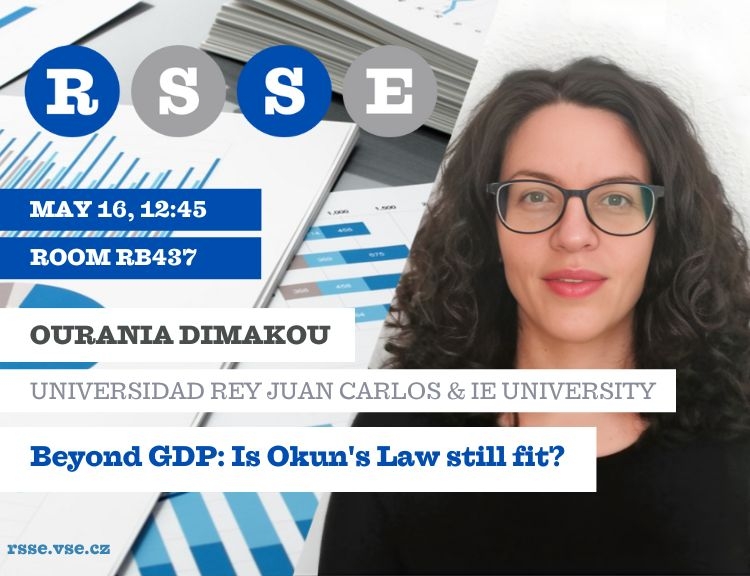Ourania Dimakou (Universidad Rey Juan Carlos & IE University) 16.5.2024
V rámci Research Seminar Series in Economics máme tu čest, že nám ve čtvrtek 16.5.2024 od 12:45 do 14:15 v místnosti RB437 bude přednášet Dr. Ourania Dimakou (Universidad Rey Juan Carlos & IE University) o „Beyond GDP: Is Okun’s Law still fit?“
Registration is not required and anyone who would like to attend is warmly invited.
It is also possible to participate online via MS Teams. To get access, please, contact lubomir.cingl@vse.cz.
ABSTRACT: This paper challenges the role of GDP, as a measure of economic activity, in the regularity and universality of Okun’s Law. Numerous empirical studies verify the stability and robustness of Okun’s law, despite quantitative and methodological discrepancies. At the same time, a large body of the literature is exposing the limitations of GDP as a measure of economic welfare or different aspects of economic activity. Our paper questions whether and to what extent Okun’s law empirical regularity is “GDP-contingent”. In other words, we ask: Is the law as stable when a different measure is used? Our work draws on adjusted disposable income to answer that. We demonstrate that, over a three-decade span and for more than 20 OECD countries, the stylised fact described by Okun law is less robust and less stable when GDP is substituted by adjusted disposable income: for a subset of countries in our sample, the relationship turns insignificant or even positive. This apparently broken, for being GDP contingent, relationship opens a broad discussion with diverse implications regarding economic policies and their socioeconomic impact when we move to explore and evaluate them on metrics distinct from GDP.
BIO: Ourania Dimakou is currently a lecturer in Economics at Universidad Rey Juan Carlos, and an adjunct professor at IE University, Spain. Ourania has a PhD in Economics from Birkbeck, University of London and have worked at SOAS University of London as a Lecturer in Economics between 2011-2020. Her research interests include macroeconomic theories and policies, public debt and international financial institutions, central banking, history of economic thought, and gender and public health policies employing a pluralism of theoretical and empirical methodologies. Currently, Ourania is working with colleagues from URJC on two projects, the first looks at the limitations of GDP from a novel standpoint, while the second dwells into unpacking the gender biases withing the literature of in-work poverty. She has published articles in various peer-reviewed international journals, as well as a book co-authored by prof Ben Fine (Macroeconomics. A critical companion. 2016, Pluto Press). She has participated in funded projects, such as the “Blended Finance: The use of development funds for de-risking private investment”, commissioned and financed by the European Parliament and presented in the DEVE Committee of the European Parliament in July of 2020. She have completed a series of PhD theses and served as reviewer for international journals as well as member in committees for conferences and other institutions (such as International Initiative for Political Economy (IIPPE), Reteaching Economics). Last but not least, she has ample teaching experience at various undergraduate and postgraduate levels in English and Spanish.
